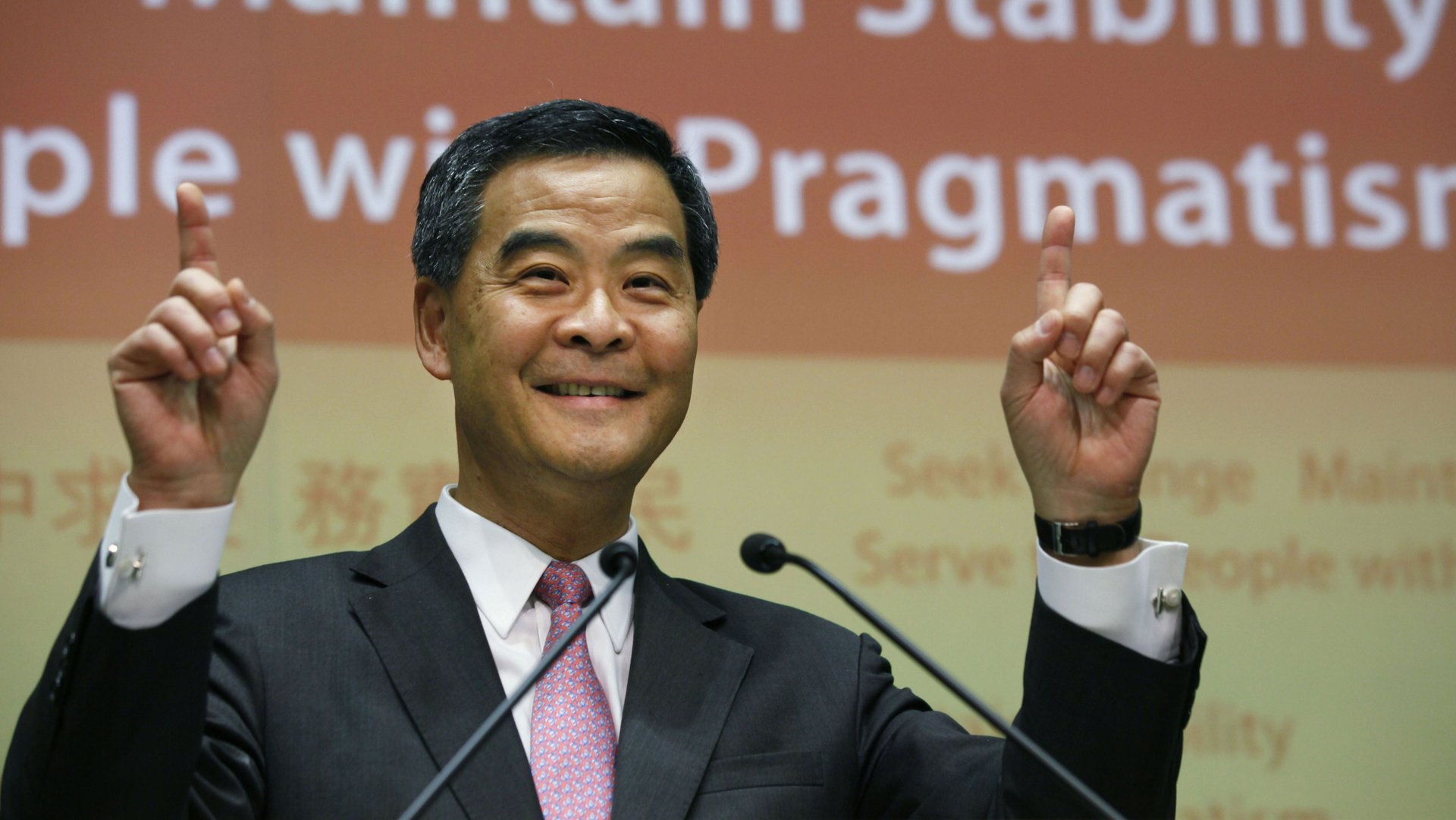Hong Kong’s fading love affair with its property barons signals Beijing’s growing clout
The Hong Kong government and its real estate tycoons have long operated in friendly collusion. The decades-old deal works like this: when Hong Kong falls on hard times, the government restricts land supply to keep property values buoyant—and to keep the industry barons, who profit massively from selling increasingly expensive, ever-smaller apartments to the city’s population, happy.


The Hong Kong government and its real estate tycoons have long operated in friendly collusion. The decades-old deal works like this: when Hong Kong falls on hard times, the government restricts land supply to keep property values buoyant—and to keep the industry barons, who profit massively from selling increasingly expensive, ever-smaller apartments to the city’s population, happy.
But Hong Kong’s new chief executive—a leader chosen by business elites who tend to vote for the man they believe the Beijing government likes the best—is putting an end to this cozy relationship. In his first annual policy address, C.Y. Leung, who took up his role early last year, vowed to increase land supply and the building of new homes. This comes after Leung’s administration lashed out at the developers by stinging them with a property tax aimed at curbing speculative real estate investment.
His announcements signal that Hong Kong—which, with its independent judiciary and Rotary Club version of democracy, prides itself on its separation from mainland China—is increasingly exposed to interference from by Beijing. And what that interference so far suggests is that the Chinese central government has Hong Kong’s freewheeling and fabulously wealthy property tycoons in its sights.
Though it might seem unusual for Beijing, through the Hong Kong chief executive, to target a specific industry group, this trend has been building for a while. First, there’s that the real estate elite has outlived its usefulness. When Hong Kong returned to Chinese control after the 1997 British handover, the Communist Party briefly viewed the oligarchs as people who would provide a stable pillar for Chinese rule. Now that the relationship between the Chinese government and Hong Kong has more or less gelled, making those tycoons no longer all that useful, China wants to curb their power.
But more than that, the less useful they are, the more of a threat to Beijing’s clout they present. Hong Kong’s political system is sewn up so that the property oligarchs control the majority of the votes on the 1,200-strong chief executive election committee. Beijing cannot change that in a hurry, as the city is protected from such overt interference by its quasi-constitution, the so-called “Basic Law.” But the Chinese government can remind the tycoons that it wields ultimate power over the city.
Aside from their political sway, Hong Kong’s property tycoons exert tremendous control over other industries in the territory, from retail to telecoms to banking—something that the Beijing-friendly chief executive likely finds disquieting. At least, that’s what the evidence so far would suggest. For instance, just after C.Y. Leung became chief executive, billionaire brothers Thomas and Raymond Kwok, who control Hong Kong real estate developer Sun Hung Kai Properties, were arrested and charged with bribing a government official. (They deny the allegations.) There is nothing that signals one is out of favor in Beijing quite so much as a sudden corruption probe—even in Hong Kong. Although the territory’s police are officially independent of the Chinese mainland government, they also have keen instincts for the high-profile corruption cases the territory’s Beijing-appeasing government would like them to follow, as well as which to bury.
Meanwhile, the business community was stunned that the territory’s law enforcers would target such prominent executives, who would have in the past been seen as off-limits. Hong Kong’s famously self-censoring media largely failed to draw the link between the Sun Hung Kai arrests and the chief executive’s election. But Bloomberg filled in the gaps well, with this long analysis on why “dinner time” was over for the real-estate oligarchs.
However, Leung has other reasons for taking aim at tycoons. For one thing, Hong Kong’s wealthiest developers, who make up six of the city’s ten richest people in Forbes’ latest rich list, inspire a growing amount of public resentment over cramped housing conditions and the stratospheric real estate market. (This article charts how the oligarchs control most of Hong Kong’s supply chain.) Whereas Li Ka-shing used to be lionized—locals called him “superman” for his seemingly magical ability to make money—Hong Kongers now regularly take to the streets to protest high property prices and social inequality. And unrest never sits well with the Communist Party.
But what has also deeply unnerved Beijing is new trend for protestors to wave British colonial flags during riots, symbolizing, among other things, that they enjoyed more equality under the British than under Chinese Communist rule. By targeting tycoons, then, Beijing is trying to burnish its populist cred and be seen as winning the Hong Kong people back their equality. That is, for obvious reasons, not likely to happen. But for a while, at least, it is a good message to sell.